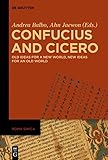Confucius and Cicero : Old Ideas for a New World, New Ideas for an Old World.
Yazar:Balbo, Andrea
Katkıda bulunan(lar):Ahn, Jaewon
Materyal türü: KonuSeri kaydı: Yayıncı: Berlin/Boston : Walter de Gruyter GmbH, 2019Telif hakkı tarihi: �2020Tanım: 1 online resource (222 pages)İçerik türü:text Ortam türü:computer Taşıyıcı türü: online resourceISBN: 9783110616804Tür/Form:Electronic books.Ek fiziksel biçimler:Print version:: Confucius and CiceroDDC sınıflandırma: 181.112 Çevrimiçi kaynaklar: Click to View
KonuSeri kaydı: Yayıncı: Berlin/Boston : Walter de Gruyter GmbH, 2019Telif hakkı tarihi: �2020Tanım: 1 online resource (222 pages)İçerik türü:text Ortam türü:computer Taşıyıcı türü: online resourceISBN: 9783110616804Tür/Form:Electronic books.Ek fiziksel biçimler:Print version:: Confucius and CiceroDDC sınıflandırma: 181.112 Çevrimiçi kaynaklar: Click to View Intro -- Table of Contents -- Roma Sinica and Confucius and Cicero: extending the boundaries and constructing relationships -- A. General perspectives -- Comparing Confucius and Cicero: Problems and Possibilities -- B. A philosophical approach -- The Private and the Public in the Republic and in the Analects -- Confucian and Daoist, Stoic and Epicurean. Some Parallels in Ways of Living -- Mind, Heaven, and Ritual in the Xunzi -- C. Key texts -- translating Confucius into Latin -- The Latin translations of Confucius' Dialogues (Lun Yu). A comparison of key concepts -- Is Confucius a Sinicus Cicero? -- D. Key concepts: philosophy, literature and culture -- Humanitas: Universalism, equivocation, and basic criterion -- Becoming human(e): Confucius' Way to$1!0f(B and the Imitation of Christ in Yi Byeok's Essence of Sacred Doctrine ( $1!BD(B $1!Bx(B -- Seonggyo yoji) -- Pietas in pro Sexto Roscio of Cicero and Confucian $1!:T(B(xiao) -- "Be modest and avoid wastefulness": table manners and beyond from Confucius to Xi Jinping -- E. A final consideration -- Cicero and Confucius: Similitude in Disguise -- General bibliography -- Index of names, main concepts and texts -- Editors and Contributors.
Roma Sinica. Mutual interactions between Ancient Roman and Eastern Thought is an original series in the classical and comparative studies. Strongly supported by the SIAC (International Society of Cicero's friends), it aims to publish works concerning the relationships between Ancient Western and Eastern (Korean, Chinese, Japanese) thought.
Description based on publisher supplied metadata and other sources.
Electronic reproduction. Ann Arbor, Michigan : ProQuest Ebook Central, 2022. Available via World Wide Web. Access may be limited to ProQuest Ebook Central affiliated libraries.







There are no comments on this title.